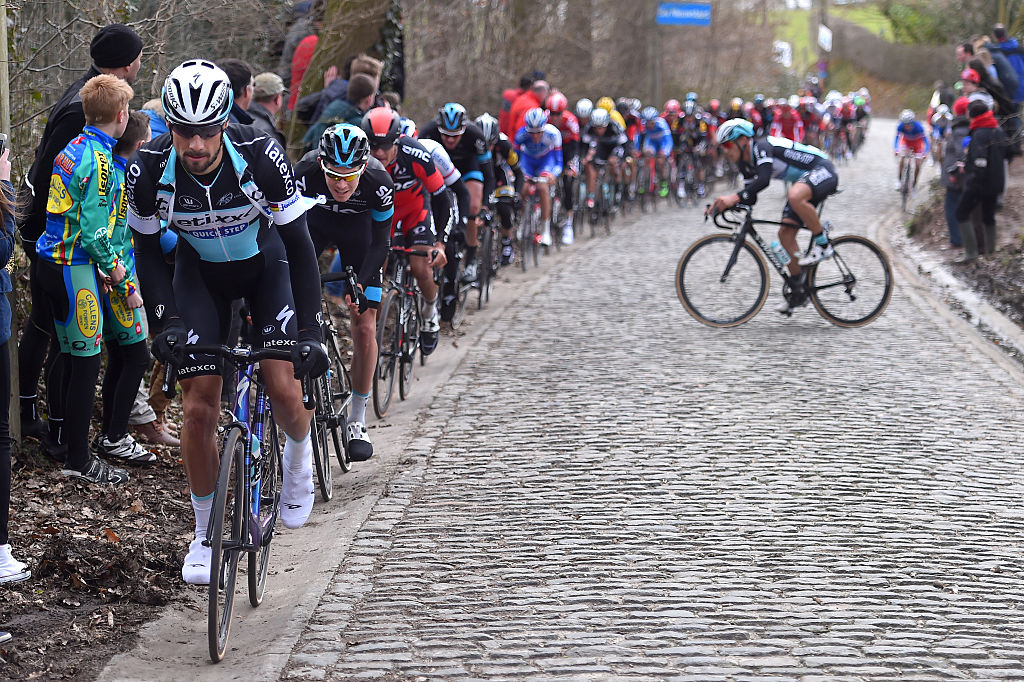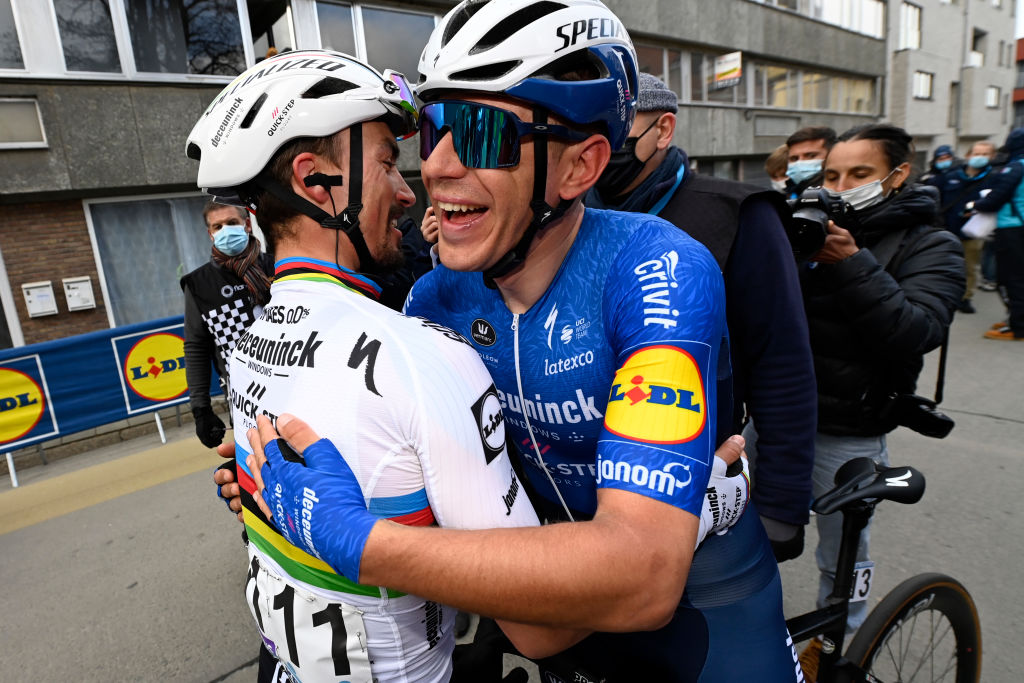'Often we get our asses kicked there' - The QuickStep approach to Opening Weekend
Directeur sportif Tom Steels discusses the biggest cobbled Classics dress rehearsal in pro cycling

QuickStep-AlphaVinyl may have won two of the past three editions of Omloop Het Nieuwsblad, but directeur sportif Tom Steels is all too aware that his riders haven’t always hit their lines in the first race of the Belgian season and the big dress rehearsal for the spring cobbled Classics.
“The Opening Weekend is still not always the easiest for us, especially Omloop Het Nieuwsblad,” Steels admitst to Cyclingnews. “Okay, we won it last year, but often we get our asses kicked there.”
Zdenek Stybar’s 2019 victory ended a 14-year drought at Omloop stretching back to Nick Nuyen’s triumph in 2005, while Davide Ballerini scored a surprise win twelve months ago, but QuickStep have regularly – and sometimes even spectacularly – fallen flat in the year’s first rendezvous on the cobbles.
Tom Boonen’s experiences are a case in point. Omloop is the only major cobbled race missing from his palmarès, as he made a habit of uncharacteristically stumbling on his lines at the old finish in Ghent, losing out to Filippo Pozzato in 2007, to Sep Vanmarcke in 2012 and, most calamitously, being part of the trio of QuickStep riders seen off by Ian Stannard in 2015.
And yet Boonen still tended to get what he needed out of Opening Weekend, and not only because he notched up a hat-trick of wins at Kuurne-Brussel-Kuurne.
By the latter part of his career, the Belgian’s traditional acceleration on the smooth gutter of the Taaienberg during Omloop had an almost ritualistic feel. It was something akin to a ceremony to mark the coming of spring, cycling’s answer to Punxsutawney Phil.
Indeed, therein lies the true importance of Opening Weekend. For all QuickStep’s pride in its status as the team that goes out with a plan to win on any and every given race day, Omloop Het Nieuwsblad is raced with an eye to preparing for the main event, the Tour of Flanders.
Get The Leadout Newsletter
The latest race content, interviews, features, reviews and expert buying guides, direct to your inbox!
The first race of the Belgian season is a prize worth winning, but it also serves to reacquaint riders with the peculiar and distinctive patterns of racing in the Flemish Ardennes.
“It's just to know what shape you’re in, because the spring classics are such atypical races, they’re unique in the season. With the small roads and the small climbs, the effort is very different,” Steels explains.
“At least you know where you are after Omloop. That’s the good thing about the Opening Weekend. But of course, on a Belgian team, it’s still important to be good there.”
On occasion, QuickStep have rectified Omloop misfires within the space of 24 hours. After a poor display in the rain in 2014, the squad responded by blowing Kuurne-Brussel-Kuurne apart the following afternoon, placing five riders in the ten-man group that contested the sprint, with Boonen taking the spoils.
Any internal inquest at QuickStep after a disappointing Omloop tends to be rather calmer than following, say, a collective failure at E3 Saxo Bank Classic or Gent-Wevelgem. After all, no rider has ever managed to win Omloop and the Tour of Flanders in the same season. Even in modern cycling, it seems possible to be too good too soon. The cobbled Classics still appear to adhere to their traditional logic.
“Like I said, it’s the first time you go to those atypical races, and if your condition is a bit less there you feel it directly. It’s just a long, hard effort, especially on those short climbs that take a lot of power away from you,” says Steels.
“Sometimes it goes well on three or four accelerations, and then the fifth time, you’re too full of lactate and you’re just not there anymore. That’s something that will not happen the further you get in the season, but it’s still a long way [from the Tour of Flanders].”
Steels won Omloop Het Volk, as it was then known, in 1996, when he was an emerging talent at Mapei. That same spring, he would go on to win Gent-Wevelgem, but the team’s A-list roster of Classics stars, chiefly Johan Museeuw, Gianluca Bortolami, Andrea Tafi and Franco Ballerini were all either subdued or absent on Opening Weekend. At Paris-Roubaix six weeks later, however, they occupied four of the top five places at the velodrome.
“I usually say that if you’re at your top shape at the end of Paris-Nice or Tirreno, then you will do a good Spring season. If you are already flying in Het Nieuwsblad, then it’s a long way to go until the Tour of Flanders and Paris-Roubaix,” say Steels.
“Condition-wise, if you’re at the top level for three weeks, that’s already a lot.”

Racing without Julian Alaphilippe
2021 Omloop winner Davide Ballerini appears to have taken that advice to heart.
He was already running on fumes by the time the Ronde came around last year, and this time out, he has opted to forgo the Opening Weekend altogether. QuickStep-AlphaVinyl will also be without Tim Declercq this weekend, after he was diagnosed with pericarditis, while world champion Julian Alaphilippe has opted to forgo the cobbles this season in order to focus on the Ardennes Classics.
QuickStep-AlphaVinyl didn’t add any established new names to their cobbled Classics roster on the transfer market this winter, and indeed, their last such splash came back in 2017, when Philippe Gilbert arrived from BMC. In the years since, Boonen has retired, and Gilbert and Niki Terpstra have left, and yet the beat has gone on, despite the emergence of Wout van Aert and Mathieu van der Poel as rivals.
While Alaphilippe is an undoubted loss to the cobbled Classics unit, QuickStep’s collective might will still be a factor. Every year, another internal candidate tends to take a stride forward, as Kasper Asgreen did when he surprisingly placed second at the Tour of Flanders in 2019. Asgreen, winner of last year’s Ronde, is now a figurehead alongside Stybar and Yves Lampaert, but Alaphilippe’s absence theoretically leaves space for another rider to emerge.
“With Julian not in, it’s a different ball game, but we still have some riders who can ride the Spring Classics,” Steels explains.
“For instance, a guy like [Jannik] Steimle really has the physical capacities to do well there, and then of course we still have Kasper, Yves and Stybar, who is going well again, and Florian [Sénéchal] has stepped forward.
“We have the guys with the body to do well there. Maybe we don’t have one outspoken leader, but in those races, maybe it’s better to have five good ones that will never miss the breakaway, because controlling the race is so difficult.”
On Saturday, Asgreen - who recovered from COVID-19 to ride the Volta ao Algarve, Lampaert, Sénéchal and Stybar will lead the line at Omloop. The following day, Fabio Jakobsen is the team's sprint option at Kuurne-Brussel-Kuurne, with Lampaert and Stybar among those doubling up.
“I think Kasper is back on track, and he got better day by day, but of course the plan was anyway for him to be at his top after Tirreno, not now.” Steels points out.
“Of course, good riders can always perform at 90%. They don’t always have to be 100% to be there in the final.”
In other words, the Tour of Flanders is still five weeks away, and form is not yet a prerogative, but that doesn’t mean the races aren’t there to be won this weekend. Especially when you ride for QuickStep-AlphaVinyl and race on home roads.

Barry Ryan was Head of Features at Cyclingnews. He has covered professional cycling since 2010, reporting from the Tour de France, Giro d’Italia and events from Argentina to Japan. His writing has appeared in The Independent, Procycling and Cycling Plus. He is the author of The Ascent: Sean Kelly, Stephen Roche and the Rise of Irish Cycling’s Golden Generation, published by Gill Books.